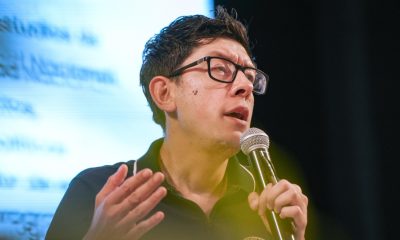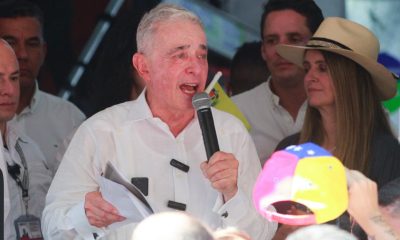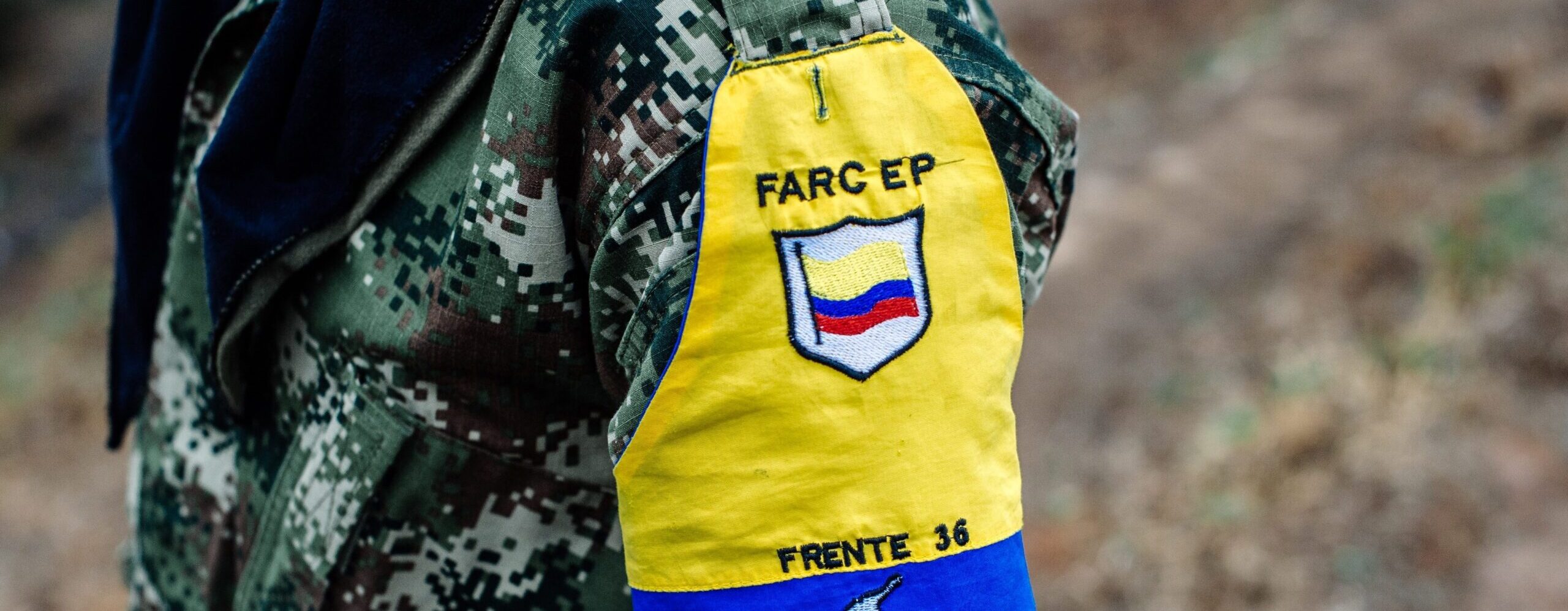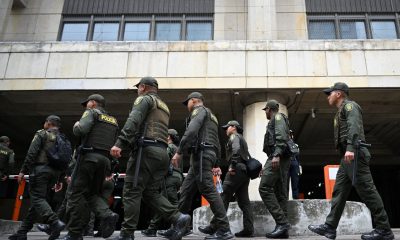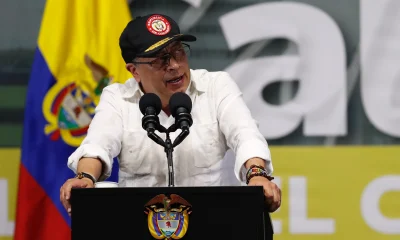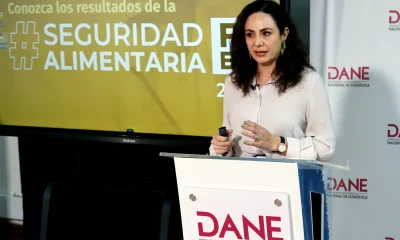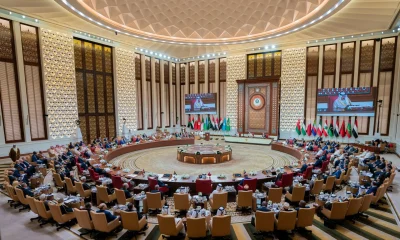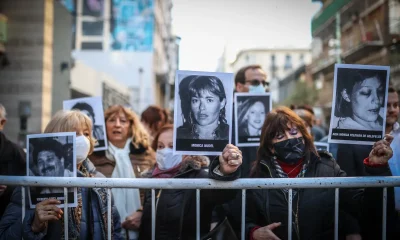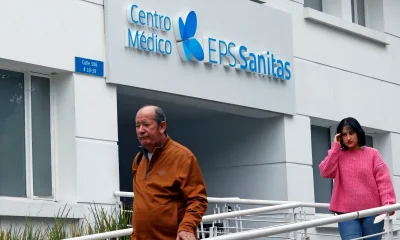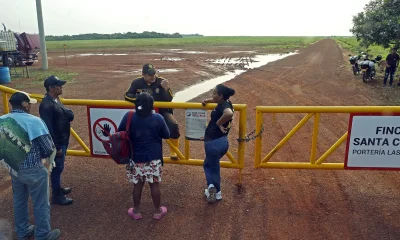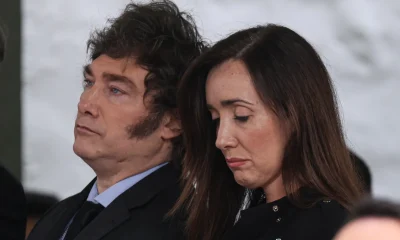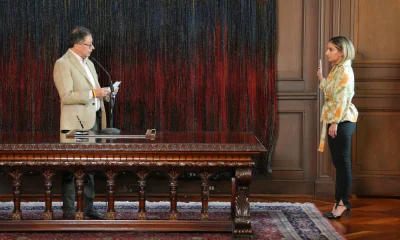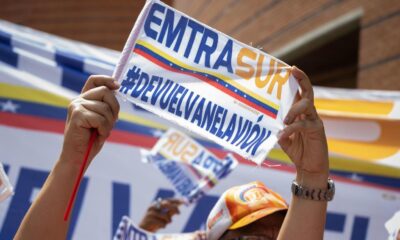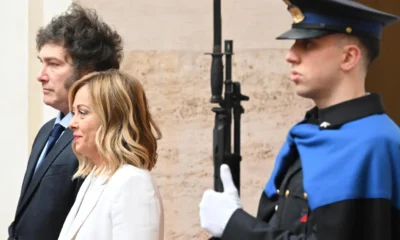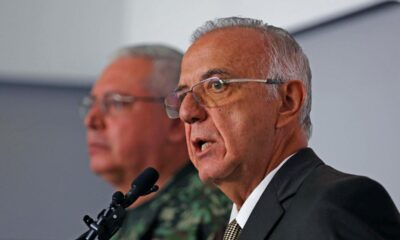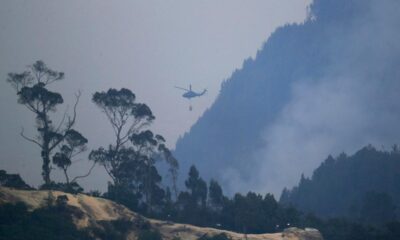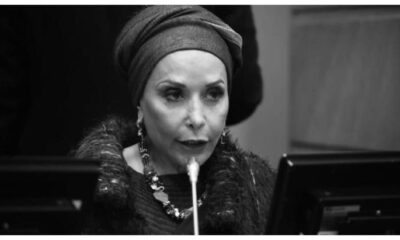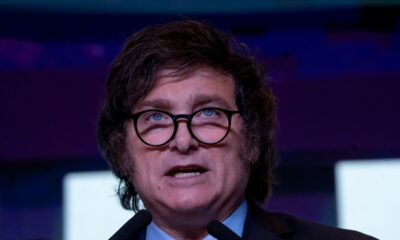International
Foreign ministers of Colombia and Argentina settle crisis and open a “new moment” in the relationship
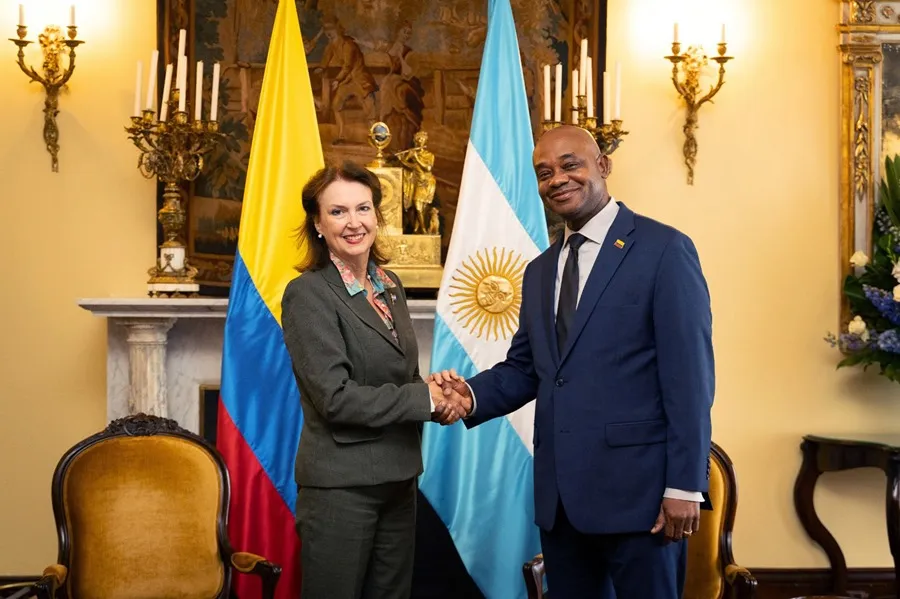
The chancellor in charge of Colombia, Luis Gilberto Murillo, and his Argentine counterpart, Diana Mondino, met in Bogotá to settle the diplomatic crisis caused by the repeated offenses of President Javier Milei to his counterpart Gustavo Petro and start a “new moment” of the bilateral relationship.
The meeting took place at the Palacio de San Carlos, headquarters of the Foreign Ministry, where Murillo and Mondino shook hands after three months of diplomatic tensions.
“It was a very productive meeting where we found areas of collaboration in different sectors; cooperation on security issues, cooperation on commercial issues, economic development and, above all, reaffirming our areas of understanding,” said the Colombian minister.
Murillo added that there is “a very close relationship between Colombia and Argentina and this is a new moment in the relationship that we want to maintain in very pragmatic terms and for the benefit of both countries, both peoples and both nations.”
The meeting was behind closed doors but in photos released by the Colombian Foreign Ministry, the two foreign ministers are smiling and accompanied by other officials.
The meeting began at noon and in it Murillo and Mondino discussed issues such as bilateral trade, tourism, cooperation, security and business development, among others.
According to the Ministry of Foreign Affairs, “Colombia has a special interest in expanding the commercial agenda with Argentina in tourism and sustainable development,” while stressing that the two countries have “a strong cooperation relationship on defense issues.”
During her visit to Bogotá, the chancellor also met with the special representative of the UN Secretary-General in Colombia, Carlos Ruiz Massieu, and plans to meet with the head of the OAS Peace Process Support Mission in Colombia (MAPP/OAS), Roberto Menéndez.
Two weeks ago, when announcing Mondino’s visit, the Colombian ambassador to Buenos Aires, Camilo Romero, assured that the purpose was to “renew the bonds of friendship that have united us for more than 200 years,” since “the affection, affection and brotherhood of our peoples must always be superior.”
Romero had been called to consultations in Bogotá on January 26, after Milei assured, in an interview with journalist Patricia Janiot, that the Colombian president “is a murderous communist who is sinking” the country.
That was the first chapter of the quarrel between the two Governments over Milei’s statements, who a month later, on February 24, referred to Petro as “a lethal plague for the Colombians themselves,” in response to a question from a journalist from the NTN24 channel, which caused a “energic rejection” by the Foreign Ministry of Bogotá of what he called “irresponsible statements” of the Argentine president.
The straw that broke the camel’s eye was the interview given on March 26 by Milei to the CNN en Español channel in which he called Petro a “terrorist murderer.”
What motivated the announcement of the expulsion of diplomats from the Argentine embassy in Colombia, a drastic measure that was not implemented.
On March 31, in a joint statement, the Argentine and Colombian Foreign Ministries said that they had held talks to “strengthen diplomatic relations,” a gesture that indicated that the waters had calmed down and that today’s meeting confirms that normality has returned.
After this Friday’s meeting, Romero assured that what happened “should never have happened,” but “the Governments, the Foreign Ministries have done a great job, the voice of diplomacy has been imposed on that of insults.”
Romero added that today’s meeting “whe does is honor the past: 201 years of relations between the two countries and of course strengthen that bond, that bond (…) for the well-being of the people and the well-being of the citizenry.”
“This shows how to solve conflicts, something very necessary in today’s world,” said the Colombian ambassador in Buenos Aires.
International
Spain’s irregular migrant population rises to 840,000, study finds
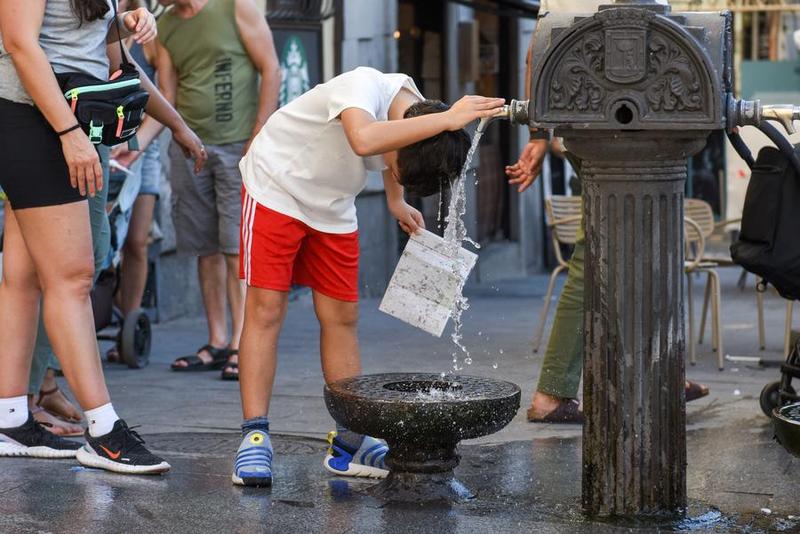
The number of migrants living in Spain without legal residency status continues to rise and has reached 840,000 people, with 91% originating from the Americas, particularly Colombia, Peru and Honduras, according to a report by the Spanish think tank Funcas (Foundation of the Savings Banks).
An estimated 17.2% of the non-EU foreign population living in Spain is in an irregular administrative situation. The estimate is based on the gap between the number of foreign residents effectively living in Spain, according to the National Statistics Institute (INE), and those who hold a residence permit, benefit from international protection, or are in the process of obtaining it.
The data, as of January 1, 2025, point to a notable and sustained increase in irregular migration since 2017, when the estimated figure stood at around 107,000 people, representing 4.2% of the non-EU population residing in Spain.
By origin, migrants from the American continent stand out, totaling around 760,000 people, or 91% of all irregular migrants. Colombians account for nearly 290,000, followed by Peruvians with almost 110,000, and Hondurans with about 90,000. Migrants from Africa (50,000), Asia (15,000) and Europe (14,000) trail far behind.
The figures predate Spain’s latest immigration regulation reform, which came into force in May 2025 and introduces measures to ease access to legal status through residency ties. According to Funcas, the reform would, in principle, tend to reduce the number of migrants in an irregular situation.
International
Historic snowstorm paralyzes Toronto after 60 centimeters of snow

Toronto, Canada’s largest city and the fourth most populous in North America, was largely paralyzed on Monday after a historic snowstorm dumped up to 60 centimeters of snow and sent temperatures plunging to -15 degrees Celsius, authorities said.
Late Sunday, as the scale of the snowfall became clear, city officials declared a climate emergency, triggering extraordinary measures including parking bans on several major streets to facilitate snow removal operations.
Toronto’s public transit authority reported that while some buses remain immobilized, subway and streetcar services are operating with relative normality, though localized disruptions may occur.
A similar situation is affecting the city’s commuter rail network, which remains operational but is experiencing significant delays on its main routes due to the severe weather conditions.
International
Venezuela frees at least 80 political prisoners, NGO says
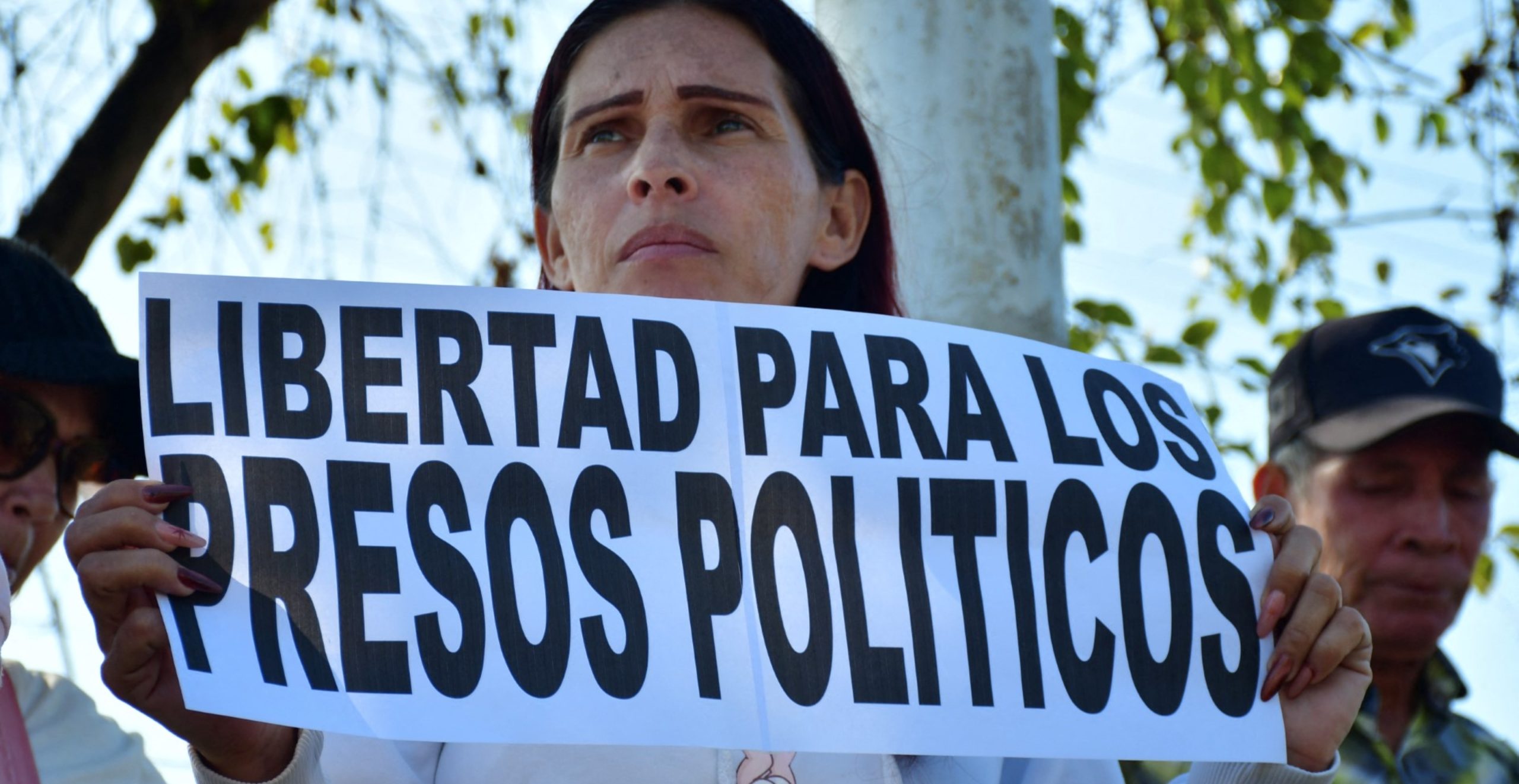
At least 80 political prisoners were released on Sunday across Venezuela, human rights group Foro Penal reported, as the broader process of detainee releases continues at a slow pace under the interim government.
Foro Penal’s director, Alfredo Romero, wrote on social media platform X that verified releases took place nationwide and that the figure could rise as more confirmations are completed.
Attorney Gonzalo Himiob, also from Foro Penal, said the excarcelations occurred during the early hours of the day and emphasized that the number is not yet final pending further verification.
The releases are part of a series of steps announced by Venezuela’s interim leader, Delcy Rodríguez, who took power after the capture of former President Nicolás Maduro in a U.S. military operation on Jan. 3, 2026. Rodríguez has pledged a significant number of liberations but has been criticized by opposition groups and rights organizations for the slow and nontransparent nature of the process.
So far, the Venezuelan government reports that 626 detainees have been freed since December, though independent counts by human rights groups suggest the number of actual political prisoner releases is lower and that many remain behind bars.
Families of those still detained have maintained vigils outside prisons, hopeful for further releases even as broader concerns about political imprisonment and due process persist.
-

 Central America4 days ago
Central America4 days agoGuatemala’s president rules out negotiations with inmates after prison riots
-

 Internacionales4 days ago
Internacionales4 days agoMajor winter storm threatens “catastrophic” ice and snow across much of the U.S.
-

 International3 days ago
International3 days agoTrump-Era Defense Plan Prioritizes Border Security and Scales Back Global Commitments
-

 Central America1 day ago
Central America1 day agoGuatemala seizes over a ton of cocaine hidden in flour at Pacific port
-

 International3 days ago
International3 days agoBogotá and Quito Seek Dialogue After Tariffs and Power Cut Escalate Tensions
-

 International4 days ago
International4 days agoGuatemala considers sending high-risk gang members to military prisons
-

 International2 days ago
International2 days agoDelcy Rodríguez seeks political agreements after Maduro’s ouster
-

 International1 day ago
International1 day agoHistoric snowstorm paralyzes Toronto after 60 centimeters of snow
-

 International2 days ago
International2 days agoFederal immigration agents kill man in Minneapolis, sparking protests and outrage
-

 International4 days ago
International4 days agoRights group says over 5,000 killed in Iran protests, mostly civilians
-

 International1 day ago
International1 day agoSpain’s irregular migrant population rises to 840,000, study finds
-

 International1 day ago
International1 day agoRights group says nearly 6,000 killed in Iran protest crackdown
-

 International1 day ago
International1 day agoVenezuela frees at least 80 political prisoners, NGO says
-

 International1 day ago
International1 day agoEU launches new probe into X over AI-generated fake nude images
-

 International1 day ago
International1 day agoFrance debates ban on social media for children under 15
-

 International1 day ago
International1 day agoSevere winter storm grips U.S., leaves multiple dead as extreme cold persists

































